Boiz Being Boiz: Group Members Find Identity, Community Through Drag
By Hope Lenamon
Reporting Texas
Alex Andersen (he/him) sits on a folding chair, arms draped over the back, and presses play on his computer. As the opening notes of “Mein Herr” begin to play, people behind him, with folding chairs of their own, mimic his movements as he waves seductively at an imaginary crowd and performs a burlesque-style dance. When Andersen cuts off the music, the group erupts into cheers and high-fives; they made it through the routine without a mistake.
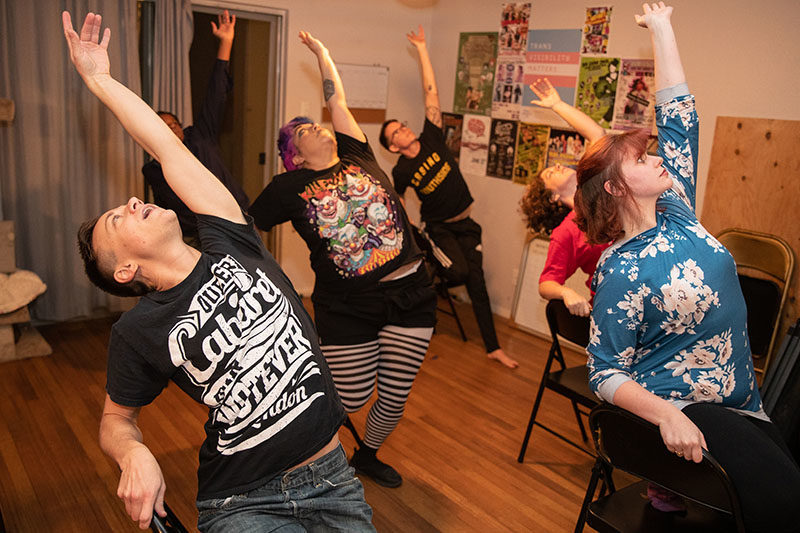
Members of the drag king troupe Boiz of Austin rehearse for the upcoming Austin International Drag Festival on Oct. 16, 2019. The troupe practices every Wednesday. Joshua Guenther/Reporting Texas
Members of the group calls themselves “Boiz of Austin.” This is the city’s only drag king troupe, which meets every Wednesday to rehearse for their next show. Traditionally, drag kings have been defined as women performing masculinity. For many, the decision to identify as a king also was the beginning of a journey through personal identity and finding community. In 2015, Boiz of Austin set out to tear down barriers and redefine what it means to be a king in the queen-dominated world of drag.
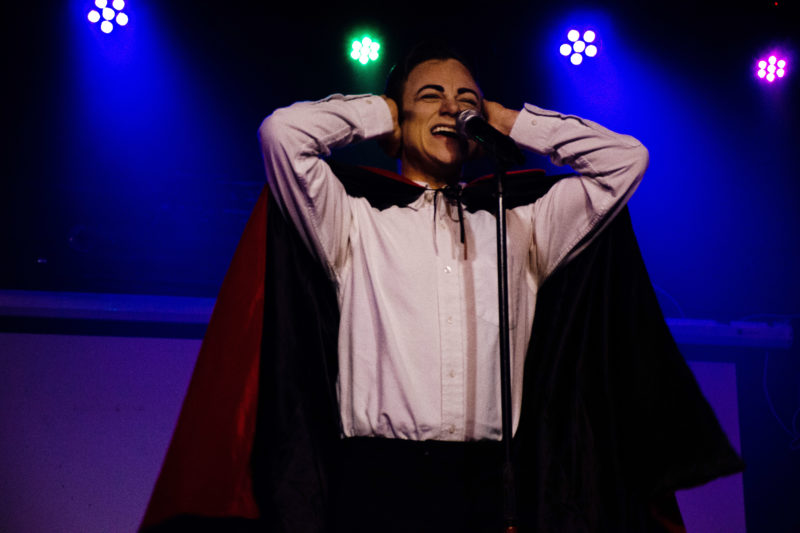
Alex Andersen, whose drag king name is Alexander the Great, performs a Taylor Swift and Halloween inspired number at Elysium in Austin, Texas, on Oct. 8, 2019. “I think drag king is a self-identifying term,” Andersen said. “I am a king because I am a king.” Hope Lenamon/Reporting Texas
“I think it’s typical to say a drag king performs masculinity, but that’s not necessarily true,” Andersen, a co-founder of Boiz of Austin, said while sitting at his kitchen table after a final run through of the group’s routine. “I think drag king is a self-identifying term. I am a king because I am a king.”
Maxwell Crouch (he/him), founder of Boiz of Austin, finds people are not always as accepting of all types of drag kings. As a trans man and 10-year drag performer, he said he has watched the world of drag slowly become more accepting of different interpretations of drag kings.
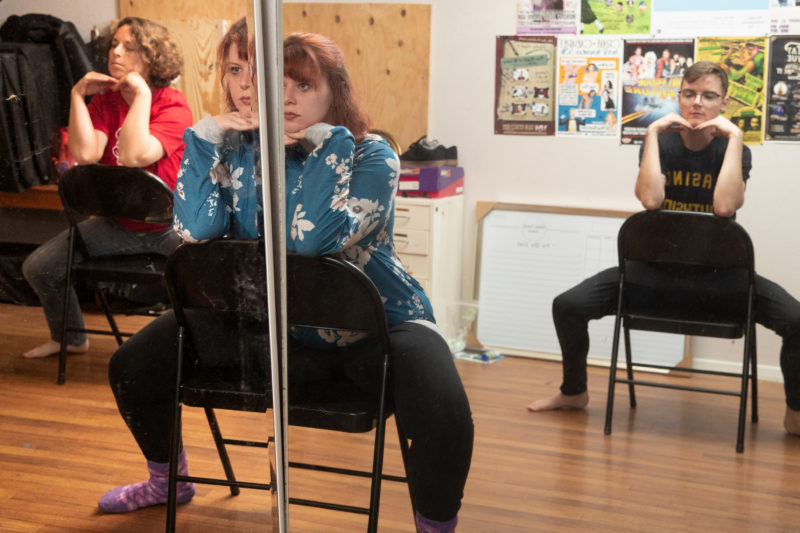
Some Boiz of Austin members credit drag for taking them on a journey of self discovery. Jessica Cochran, from left, Mikayla Stocks and Maxwell Crouch reflect in a mirror during rehearsal at a South Austin apartment on Oct. 16, 2019. Joshua Guenther/Reporting Texas
“You didn’t see trans people being celebrated in drag like they are now, which is great because I feel like we’re no longer being invalidated,” Crouch said. But he noted there are still people who disagree with the validity of non-traditional drag queens and kings.
Because the world outside Boiz of Austin is not always as accepting of things that stray from the status quo, Andersen and Crouch said they strive to ensure the troupe is a space where all kings, regardless of gender identity, are welcomed.
That feeling of community is important. A study by the Centre for Education and Inclusion Research at the University of Northampton found that within LGBTQ populations, a sense or experience of community correlated with increased wellbeing, including reduced isolation, heightened confidence and self-esteem and improved or maintained physical health,
For Valeri Ablego (they/them), who performs with the Boiz under the stage name Papi Churro, finding drag and Boiz of Austin exposed them to the language necessary to figure out their own two-spirit identity, a modern term from their Native heritage that describes a person with both masculine and feminine spirits.
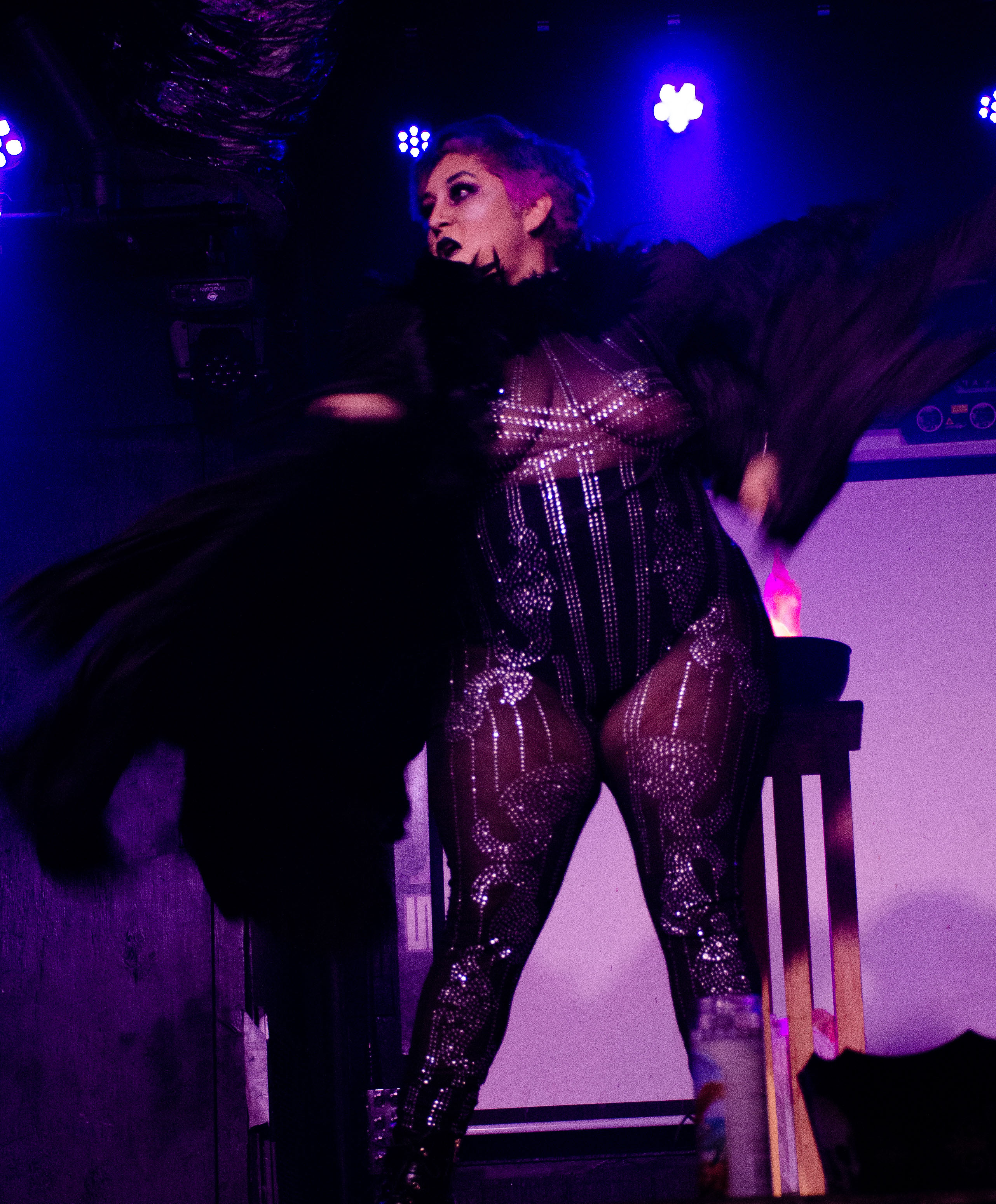
Valeri Ablego, whose drag king name is Papi Churro, performs a witchcraft inspired number on Oct. 8, 2019 at Elysium in Austin, Texas. The troupe performs on the second Tuesday of the month. Hope Lenamon/Reporting Texas
All three members of the Boiz have dealt with depression and anxiety, as have 30% to 60% of lesbians, gay men, bisexuals and transgender people at some point in their lives, according to a report from the Anxiety and Depression Association of America.
“Drag for me was very … pivotal,” Andersen said “Without it, I wouldn’t be where I am or who I am.”
“It was a journey through self-discovery,” Ablego added. “Drag literally saved my entire life.”
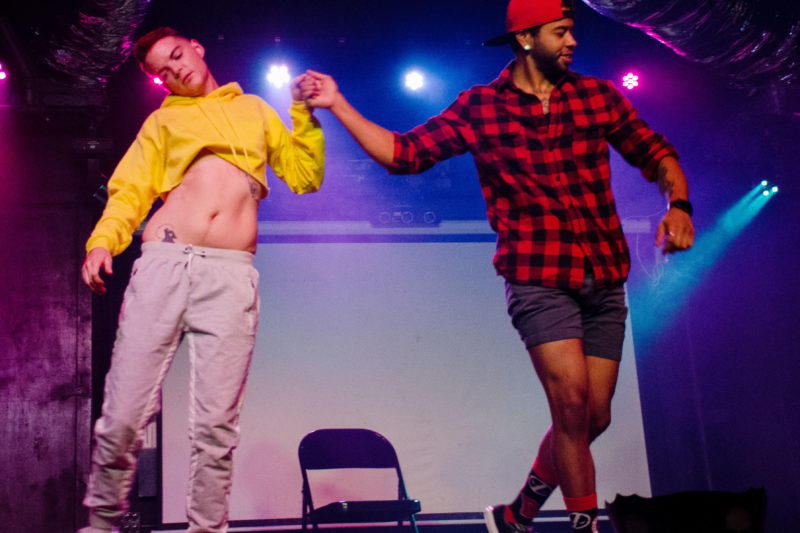
Appearing as Mad Max Morrison, Maxwell Crouch, left, and Channing Ate’Em perform a Stranger Things inspired number at Elysium in Austin, Texas, on Oct. 8, 2019. While there are many drag queen shows throughout Austin, Boiz of Austin only has one show a month. Hope Lenamon/Reporting Texas
While the Boiz may strive for this type of community, kings still seem to bump against a glass ceiling. On any night of the week, Austin drag connoisseurs have their pick of weekly and one-off drag events at venues across the city. These shows are largely, if not completely, comprised of drag queens. By comparison, Boiz of Austin have one regular show, the second Tuesday of every month at Elysium.
“There might not be as many venues who think that drag kings will pull as much money or crowd, which is why the Boiz still have a Tuesday night slot,” Adrian Clark (they/them), an academic adviser with the University Leadership Network at the University of Texas at Austin, said.
Clark performed as a drag king throughout their college career in Normal, Ill., and for a year with Boiz of Austin under the stage name Frankie Apollo. They said they noticed a strange tension between the blurring of gender norms drag is supposed to accomplish and the patriarchal, oppressive structures it still operates within.
Even in the world of drag, those who benefit from the commodification of female sexuality are often cisgender men or people whose sex at birth was assigned as male and who continued to identify as a male throughout life.
“People who are assigned female at birth are still kind of crapped on even when performing masculinity,” Clark said. “I think there’s support there within the community. I don’t know necessarily that the broader community outside of the performers themselves accepts or understands what drag kings are.”
Roughly 40 audience members attended the drag queen portion of the Oct. 8 drag show at Elysium, but when it came time for the Boiz to perform, the crowd was noticeably smaller. Phil Damon, an attendee of the drag queen show, said he felt drag kings tended to be less entertaining because they lacked flashy costumes or makeup customary at drag queen shows.
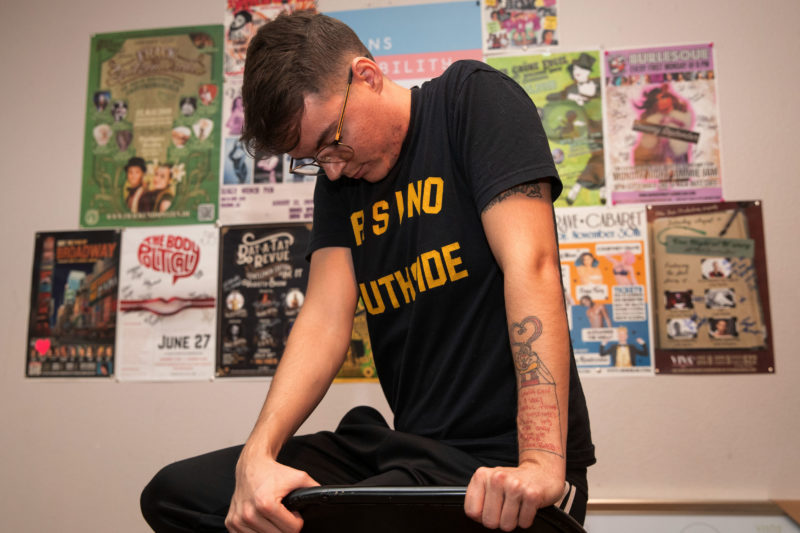
Amid a backdrop of drag posters, Maxwell Crouch, co-founder of Boiz of Austin, pauses during rehearsal for the group’s upcoming performance at the Austin International Drag Festival on Oct. 16, 2019. Joshua Guenther/Reporting Texas
Crouch said the idea that drag kings are less entertaining is something the group will always have to fight against. The Boiz’s tactic: out-perform, out-costume and put that idea to bed.
That misconception is why Anderson and many kings perform multiple talents on stage, such as singing, burlesque, comedy, cosplay and even aerial acts.
“It’s like, I’m flying around upside down. What more do you want from me?” Andersen said. “If this isn’t interesting to you then there’s something wrong with you. You’re just misogynistic.”
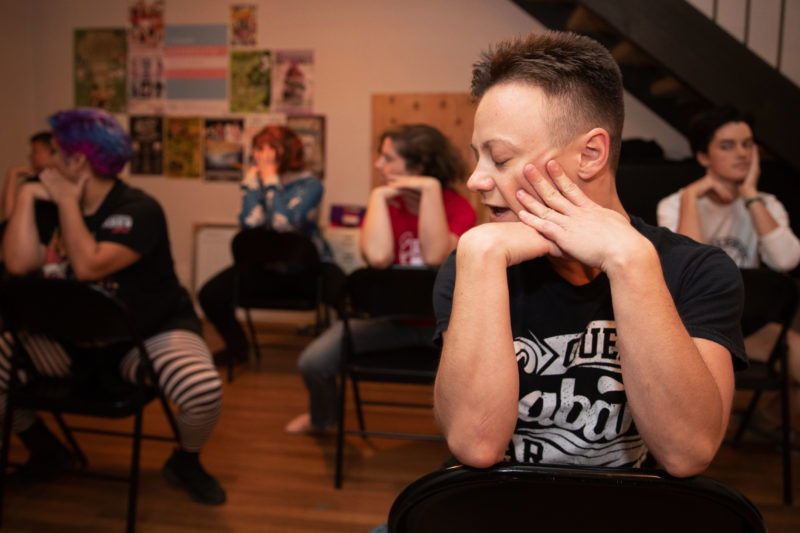
Alexander Andersen, front right, rehearses a number from Cabaret with Boiz of Austin members, from left, Valeri Abrego, Mikayla Stocks and Jessica Cochran. The drag kings want to add more shows but said they fight constant criticism that drag queens are more interesting. Joshua Guenther/Reporting Texas
Back at Andersen’s kitchen table, the group talks about plans: to perform more shows and festivals, take Boiz of Austin on a world tour and continue to be a place for all members of the LGBTQ community to find open arms and a choreographed number or two.
“Your people are out there. We exist,” Crouch said, “We’re here and queer.”